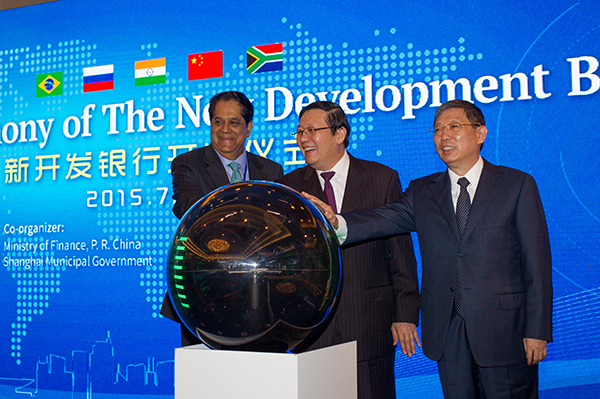 |
|
President of the New Development Bank (NDB) Kundapur Vaman Kamath (L), China's Finance Minister Lou Jiwei (C) and Shanghai's mayor Yang Xiong attend a opening ceremony of the New Development Bank in Shanghai, China, July 21, 2015. [Photo by Gao Erqiang / Asianewsphoto] |
Shanghai-based NDB will complement existing multilateral bodies and the AIIB, minister says
The long-planned BRICS New Development Bank opened in Shanghai on Tuesday as preparations for the start of operations at the end of the year or in early 2016 were stepped up.
The bank, launched jointly by Brazil, Russia, India, China and South Africa, will provide financial support for infrastructure construction, mainly in emerging countries.
Decisions will now be made regarding its organizational structure, operating rules, recruitment methods and procedures for the selection of investment projects.
Finance Minister Lou Jiwei said at the opening ceremony: "The NDB is complementary to the existing multilateral development organizations, and it will build close relationships with them and the private secto.
"The bank will provide a new driving force to accelerate the global economic recovery by supporting infrastructure construction and expanding global demand.
"It also complements the China-initiated Asian Infrastructure Investment Bank, and they will share their operational experience and strengthen cooperation when the funding of projects starts."
The NDB was proposed by the group's five finance ministers in 2012 at the G20 Summit.
In July 2014, at the sixth BRICS Summit in Fortaleza, Brazil, the countries officially announced the setting up of the BRICS bank, to be headquartered in Shanghai. An African regional center will be established in Johannesburg, South Africa.
The NDB, with its global purview and five members, differs from the AIIB, where the 57 prospective founding countries will focus on providing financial support for infrastructure construction projects in Asia.
The NDB will have initial authorized capital of $100 billion, and its initial subscribed capital of $50 billion will be shared equally among the five founding members.
K.V. Kamath, who headed ICICI Bank, India's leading private bank, for more than a decade, was previously named as the first president of the NDB.
Zhu Xian, vice-president of the World Bank, was chosen by China as one of four vice-presidents.
Klamath said he admired and appreciated China's contribution as the host country. The five founding members will continue their close cooperation to push forward the preparation work, he said.
World Bank President Jim Yong Kim said in a statement on Tuesday, "The NDB joins a growing number of multilateral institutions-including the AIIB-that are working to address the world's huge infrastructure needs."
The World Bank president added: "Emerging markets and low-income countries face an annual gap of $1 trillion to $1.5 trillion in infrastructure spending.
"We are committed to working closely with the NDB and other multilateral institutions, offering to share our knowledge and to co-finance infrastructure projects. These types of partnerships will be essential to reach our common goals to end extreme poverty by 2030, boost shared prosperity and reduce inequalities."
Karin Finkelston, vice-president and chief operating officer of the World Bank, said the cooperation between the banks will not only help to develop projects in the public sector but can also benefit the private sector.
China's funding role in the new bank and its leading role in the AIIB reflect the country's growing status on the global stage, she said.
Figures from the International Monetary Fund show that the contribution made to global economic growth by the BRICS countries in the past decade exceeded 50 percent, and BRICS economic growth will continue to be higher than that of developed countries and other emerging economies until 2030.
The AIIB gathered its 57 prospective founding countries in Beijing last month to sign a legal framework covering its objectives, membership, stakes, voting power and other issues.
According to the framework, the bank will have authorized capital of $100 billion. China has a 30.34 percent stake and 26.06 percent of the votes.
